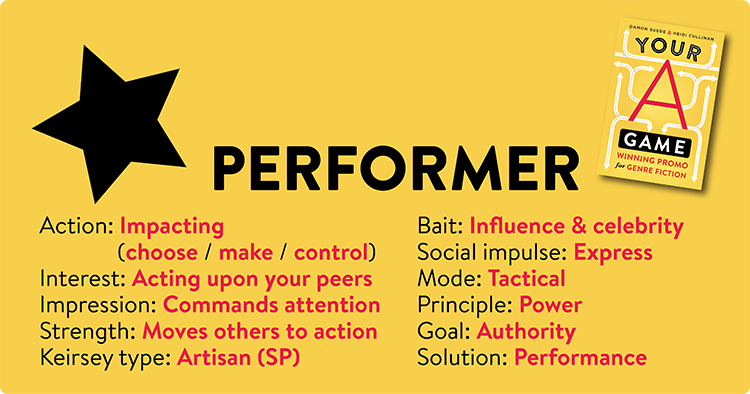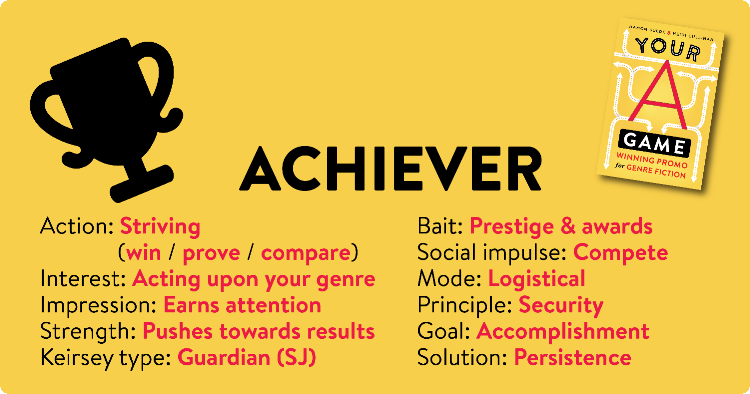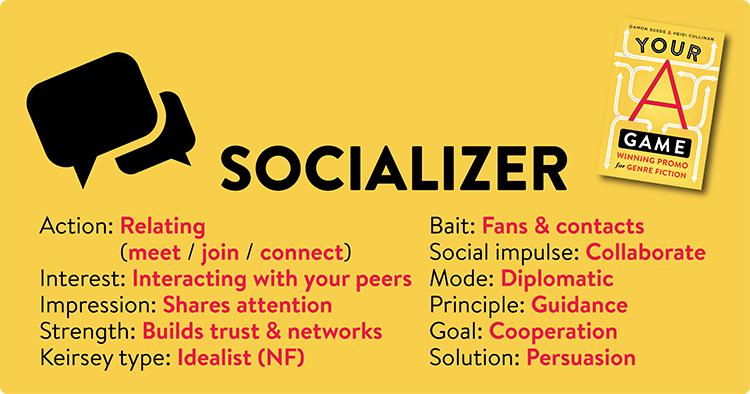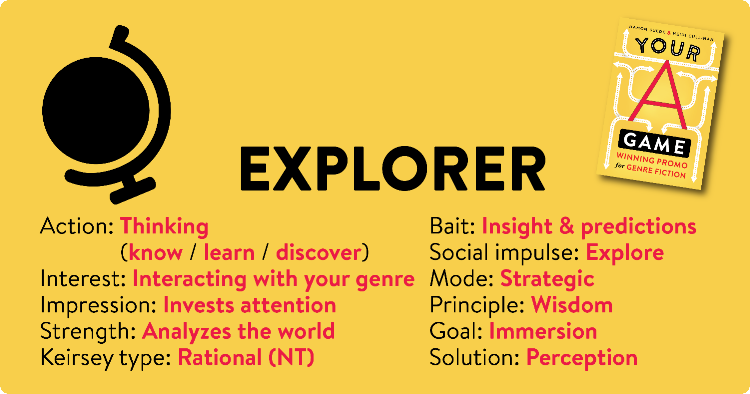Writers for Diversity class (2021)
- 1st
June 2021 Damon Suede
Class Materials
The following is a downloadable PDF of
the handout for the WfD class offered
online on 26 June 2021.
Here are some books if you'd like to dig
deeper into the topic of author branding.
-
The
Happiness Advantage: The 7
Principles of Positive Psychology by
Shawn Achor
-
A
New Brand World: Eight Principles
for Achieving Brand Leadership in
the 21st Century by Scott
Bedbury with Stephen Fenichell
-
Brands That Rock: What Business
Leaders Can Learn from the World of
Rock and Roll by Roger Blackwell
and Tina Stephan
-
You
Branding: Reinventing Your Personal
Identity as a Successful Brand by
Mark Cijo
-
Brand Warfare: 10 Rules for Building
the Killer Brand by David
D'Alessandro with Michele Owens
-
Branding Yourself: How to Use Social
Media to Invent or Reinvent Yourself (2nd
Edition) by Erik Deckers and Kyle
Lacy
-
Fascinate: How to Make Your Brand
Impossible to Resist (revised and
updated) by Sally Hogshead
-
Passion Branding: Harnessing the
Power of Emotion to Build Strong
Brands by Neill Duffy and Jo
Hooper
-
Brand esSense: using sense, symbol
and story to design brand identity by
Neil Gains
-
The Power of Habit: Why We Do What
We Do in Life and Business by
Charles Duhigg
-
Emotional Branding: The New Paradigm
for Connecting Brands to People by
Marc Gobe
-
Romancing the Brand: How Brands
Create Strong, Intimate
Relationships with Consumers by
Tim Halloran
-
BrandingPays: The Five-Step System
to Reinvent Your Personal Brand by
Karen Kang
- “Creating
brand personality with brand names”
by Richard R. Klink and Gerard A.
Athaide.Marketing Letters (Vol. 23,
No. 1 (March 2012) pp. 109-117)
-
Passion Brands: Why Some Brands are
Just Gotta Have, Drive All Night for
and Tell All Your Friends about by
Kate Newlin
-
Evil by Design: Interaction Design
to Lead Us into Temptation by
Chris Nodder
-
The
22 Immutable Laws of Branding by
Al Ries and Laura Ries (latest
edition also includes 11
Immutable Laws of Internet Branding)
-
Winning the Story Wars: Why Those
Who Tell (and Live) the Best Stories
Will Rule the Future by Jonah
Sachs
- “How
Brand Community Practices Create
Value” by Hope Jensen Schau,
Albert M. Muñiz Jr. and Eric J.
Arnould Journal of Marketing (Vol.
73, No. 5 (Sep., 2009), pp. 30-51)
-
The
Marketing Power of Emotion by
John O'Shaughnessy and Nicholas
Jackson O'Shaughnessy
-
Marketing Aesthetics: The Strategic
Management of Brands, Identity and
Image by Alex Simonson and Bernd
H. Schmitt
-
Unconscious Branding: How
Neuroscience Can Empower (and
Inspire) Marketing by Douglas
Van Praet
- “What
Great Brands Do” by Allan M.
Webber, (FastCompany, 31 August
1997)
-
Brand Atlas: Branding intelligence
made visible by Alina Wheeler
and Joel Katz
-
What Great Brands Do: Seven
Brand-Building Principles that
Separate the Best from the Rest by
Denise Lee Yohn
-
Persuading on Paper: The Complete
Guide to Writing Copy that Pulls in
Business by Marcia Yudkin
DESIGN &
TYPOGRAPHY
-
Logo
Design Love: A Guide to Creating Iconic
Brand Identities by David Airey
-
The
Elements of Typographic Style: Version
4.0 by Robert Bringhurst
-
Logo,
Font & Lettering Bible by Leslie
Cabarga
-
Stop,
Think, Go, Do: How Typography and
Graphic Design Influence Behavior by
Steven Heller and Mirko Ilic
- “Guidelines
for Selecting or Modifying Logos” by
Pamela W. Henderson and Joseph A. Cote,
Journal of Marketing (Vol. 62, No. 2.
April 1998. pp. 14-30)
-
Understanding Color: An Introduction for
Designers by Linda Holtzschue
-
Clout:
The Art and Science of Influential Web
Content by Colleen Jones
-
You're
My Favorite Client by Mike Monteiro
-
Stop
Stealing Sheep & Find Out How Type Works,
3rd Edition by Erik Spiekermann
- “Managing
Images in Different Cultures: A
Cross-National Study of Color Meanings
and Preferences” by Thomas J.
Madden, Kelly Hewett and Martin S.
Roth, Journal of International
Marketing (Vol. 8, No. 4 (2000), pp.
90-107)
On this site, you can also find
additional
Book Recommendations
and check out a selection of short exercises designed to amp your promo strategy.
If you're interested in our other classes, sign up for our spam-free newsletter to be apprised of upcoming workshops, exercises, and more.
If you're interested in our book on genre promo, you can check out samples and more info at all major book stores online by clicking here.
Why are games fun? There are certain types of interactions we each enjoy and jackpots we
pursue. That’s true for board games, team sports, and giant multiuser arenas like online
roleplaying games, paintball, and yes, even genre promotion. So what prize
are you playing for?
No two authors approach the challenges of a genre fiction career the same way or for the
same reasons. Identifying your strengths, habits, and professional interests allows you to
play the best game you can and helps you strategize with your colleagues. We believe that
promotion works best when it's communal, interactive, and joyful.
Think of your play style as your piece on the A-game board. The play style (and path) you
choose will change the discoveries and rewards you’ll encounter along the way. Play for
what matters to you Get specific about the kind of success which would mean the most right now. Knowing your goal
(and play style) gives you skin in the game and helps you play well with others.
Remember: promo always requires a team effort. Cooperation and reciprocation help the
entire genre community. Awareness of your own style will help you form meaningful partnerships
with a likeminded A-gang that fires on all cylinders. Help folks help you.
Go with your gut. None of these play styles are inherently negative or positive and none of them are more
or less likely to succeed. There are humble Performers and selfish Socializers. Over your
career you will probably operate as all of these at one point or another. What distinguishes each
type of player is what motivates them and what they want to accomplish. Each of us has shown all of these behaviors at one time or another. These
player styles literally arise from what interests you and what you find rewarding.
What’s your primary focus right now? What kind of a promotional strategy appeals? What
sounds like the most fun way to develop your career? What kind of success do you want?
In other words, what kind of an A-gamer are you?






